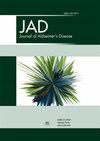Targeting SPI1 to mitigate amyloid-β pathology in Alzheimer's disease.
IF 3.4
3区 医学
Q2 NEUROSCIENCES
引用次数: 0
Abstract
SPI1, a transcription factor implicated in myeloid cell development, has emerged as a genetic risk factor for Alzheimer's disease (AD). Recent in vivo studies reveal that Spi1 knockdown in mice exacerbates AD pathology by increasing amyloid-β aggregation and gliosis while Spi1 overexpression ameliorates these features. Transcriptomic analyses suggest that Spi1 regulates microglial immune response, complement activation, and phagocytosis. SPI1 regulation of these processes may explain how SPI1 affects AD risk. Further studies, including human validation, are needed to explore the dynamic influence of SPI1 across AD stages, its applicability to clinical settings, and its potential as a therapeutic target.
求助全文
约1分钟内获得全文
求助全文
来源期刊

Journal of Alzheimer's Disease
医学-神经科学
CiteScore
6.40
自引率
7.50%
发文量
1327
审稿时长
2 months
期刊介绍:
The Journal of Alzheimer''s Disease (JAD) is an international multidisciplinary journal to facilitate progress in understanding the etiology, pathogenesis, epidemiology, genetics, behavior, treatment and psychology of Alzheimer''s disease. The journal publishes research reports, reviews, short communications, hypotheses, ethics reviews, book reviews, and letters-to-the-editor. The journal is dedicated to providing an open forum for original research that will expedite our fundamental understanding of Alzheimer''s disease.
 求助内容:
求助内容: 应助结果提醒方式:
应助结果提醒方式:


